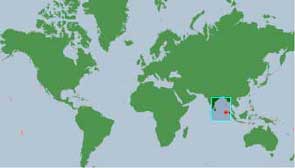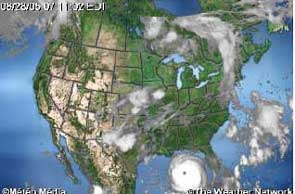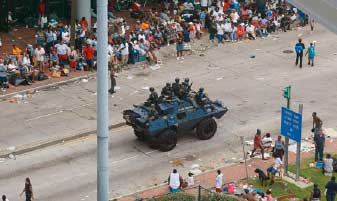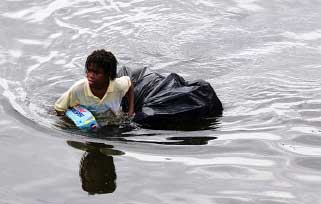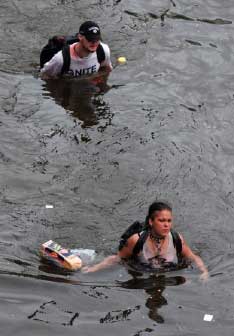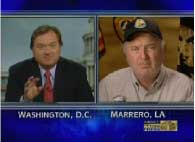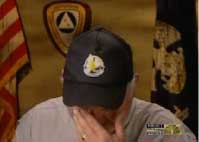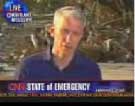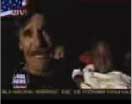 |
→ September 2005 Contents → E-bits
|
E-Bits: Katrina
|
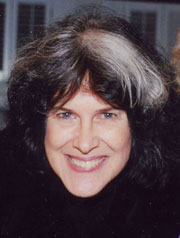 |
|||||||||||||
|
As I write this on September 6, 2005, a full week after Hurricane Katrina hit land in New Orleans, I admit I have been trying for days to find a word or a phrase as the subject of this month's E-Bits. I am reminded of December's tsunami in the Indian Ocean, half a world away, which drove me to philosophical thoughts about the earth, mankind, how we are all in this together. Emotions worldwide ran high after the tsunami, as did compassion for the people of so many countries who shared in that terrible experience. We witnessed relief efforts from all over the world responding immediately to the situation; we grieved the loss of life and environment as we realized an unfathomable number of souls and area of coastal beauty were destroyed. Moreover, that natural disaster of monumental proportions was unprecedented by having a billion eyewitnesses to the drama as it unfolded. Words and phrases that came to mind were elevated notions such as humanity and humanitarianism, cooperation, compassion, struggle, global tragedy, witnessing, collective awareness, the greater whole, instant communication, and "we are not alone."
The aftermath of Katrina is something quite different, however, and I am at a loss to find much in this devastating tragedy that has brought inspirational words and phrases to my inner notepad. At this writing I can only think of catastrophe, disorganization, desperation, filth, abomination, and failure. Haunting me also from the last week are phrases such as "total breakdown," "lack of compassion," "living in squalor," and "treated like animals." More fitting than anything, when help did not arrive in a timely fashion: inconceivable, "an inexcusable abandonment." I thought, then dreamt, of Dante's Inferno. Together, we watched as our fellow citizens of New Orleans and the Gulf Coast area suffered a neglect so outrageous, so public, so transparent, and so blatant that not one person in the massive community that watched the international broadcasts can ever forget what they heard and saw, and no censorship, spin, or propaganda could be great or clever enough to erase any future disconnect between what we witnessed and what will be said about it later.
Experts tell us that the first 72 hours after a hurricane are the most critical in terms of rescue and survival. If we were inspired at the extraordinary response to an enormous humanitarian crisis within 24 hours of the tsunami in Indonesia, we were horrified en masse for over 96 hours with absolutely no relief to thousands upon thousands of people visibly suffering and dying before our very eyes, for all the world to see. Somewhere around hour 80, after having spent the first 36 hours still vacationing and golfing, strumming a guitar, offering another new reason for the war in Iraq (at last, "oil"), our president visited two devastation areas in Mobile, Alabama, and Biloxi, Mississippi, for a few photo-ops, kissing and hugging apparent victims (they were not victims but had returned to retrieve clothes for a brother, who had escaped with only his life). Mr. Bush then posed for photos observing efforts to repair one of the breached levees, staged for his photo, after which it was reported the crew and equipment making the bogus repair left the area. He announced, "I understand that the devastation requires more than one day's attention," then joked around in the airport before leaving, recalling nostalgically his youthful days of drinking and partying in New Orleans. Handshaking and back-patting, he thanked Homeland Security and FEMA for the tremendous job they were doing. My shocked 82-year-old friend commented that the president's arrival in New Orleans, broadcast on a split screen beside images of a convoy of supplies rolling in, looked like General Patton arriving in Messina in 1943. With two presidential visits to the area now, we have learned that all helicopter rescue operations were suspended the entire time he was on the ground. Bloggers wondered how many lives were lost due to these precious moments sacrificed to giving glib assurances and photo ops.
Friday evening, hours after the president went back to Washington, the desperately dehydrated and delirious people stranded in New Orleans hospitals, on highways and bridges, and at the Superdome and Convention Center still had not received any food, water or supplies that could have been airdropped to them days before. We learned that early on, WalMart brought three truckloads of water and supplies but were turned away by FEMA, who also turned away diesel fuel deliveries, and even cut emergency communications lines which local workers reconnected at their own peril. Hummers and trucks with teams of fully-armed National Guard and police under shoot-to-kill orders passed by thousands of needy victims numerous times, but nothing that they needed was provided. They were forced to stand, sit or lie in urine and human feces aside decomposing bodies, locked in and prohibited from leaving on foot for safety. One victim, Denise Moore, wrote that they thought they had been sent to the Convention Center to die, that they would shoot them all.
A tsunami victim wrote in contrast about the situation in Sri Lanka, how so many people and so much support arrived almost immediately, with everyone helping each other, and that no one stole even from wealthy tourists. Reports tell of an initial calm in New Orleans in the aftermath, with dazed people wading in waste-high toxic waters foraging for food and potable water and being discouraged from looting luxury items by police, who had no capability of making an arrest in cases of serious looting. As time progressed, people became increasingly desperate and dehydrated. In a short time criminal looters commenced alongside foragers, and finally, shoot-to-kill orders were issued by authorities. According to an interview by Diane Sawyer with the president, he ordered that no distinction be made between looters of different types of items, even water. One gentleman told a newscast journalist he took water and food from a store, and left a note, listing the items he took so he could pay for them later. Abandoned to their own devices in this debacle for days and days, survivors in the devastated New Orleans said they had no alternative but to live in horrific conditions, like animals. Two similar photographs with controversial headlines, now removed from many sites, amplified the racial overtones to the tragedy in New Orleans. One photo from Associated Press shows an African-American male wading in chest-deep water with food he is described as having "looted;" and from Agence France-Presse, a photo caption of a Caucasian couple wading in chest-deep water describes them as "finding food." These photos and captions from an article in The New York Times by Tania Ralli.
Comparing the chaos after the tsunami to the chaos in New Orleans, the Sri Lankan writer commented that it was clear which part of the world was civilized. Offer after offer after offer of emergency relief help was turned away, and critically needed first-responders were impeded, even stopped by bureaucracy and hierarchy and chains of command. When the chief isn't leading his subordinates and serving the people, when those lower in rank are waiting for orders that never come, when the most powerful are quick to disenfranchise and blame, even shoot with intent-to-kill innocent victims themselves--some of whom were merely trying to survive--what kind of civilization is that? We must think very, very hard about this question, as next time it may be our town or our area that is devastated by some catastrophic event. When trust turns to fear, there is not much left to be lost. This is all of us. All of us are in this together, and if you think not, imagine your own mother finally floating face down in the attic after days and days of waiting and being assured that someone will come and help her. This could not be expressed more profoundly than by Aaron Broussard, president of Jefferson Parrish, as he appeared on Meet the Press on Sunday, September 4th, in the following video clip.
The press managed to broadcast from situations in critical areas about which federal officials claimed to be unaware, astonishingly, a full five days into the disaster. One such location was the New Orleans Superdome, which contained some 30,000 increasingly desperate and dying people. Everyone watching broadcast news knew the night before the storm hit that those people were there. Journalists begged the government to help, but as late as Saturday officials claimed they did not know about them. As the press themselves became more and more distressed, it was as if they were shocked out of a too-long and deferential stupor, awakened to their lost passion by their own compassion and outrage over an undeniable, horrifying truth. Normally conservative reporters held nothing back even as spinmasters tried to quell their frustration and rage, and others defying categorization showed us a side of reporting we rarely see. The three most notable examples of telling it like it is came from Anderson Cooper of CNN, and Geraldo Rivera and Shepard Smith of FOX NEWS. Click on each photo to play the corresponding video clip.
Publication date of The Digital Journalist is September 11, five whole days from now. We are told to brace ourselves and we can only guess what will unfold during that time. Happily, relief efforts are beginning to fully engage, yet as pumped waters recede new horrors will reveal themselves. At this point, there is in some instances a palpable struggle between stressed, weary journalists on the scene and smartly suited news anchors in the studios, with those in the field still trying to let jack out of the box and some of the anchors trying to keep the lid on. More control of reports and images cannot be very far off. We are repeatedly hearing Randy Newman's song "Louisiana 1927," sung by Aaron Neville, accompanying images of this tragedy. Many, like myself, upon hearing the beautiful song, are reduced to tears. You can find a short clip of this this song on Amazon.com.
What has happened down here, is the winds have changed
I am reminded of a quote by Publilius Syrus, "Anyone can hold the helm when the sea is calm." As we hope for calm, let us stand for and assist all victims of natural or man-made disasters the world over. Until October.
© Beverly Spicer
The links that appear in this column are from the World Wide Web. Credit is given where the creator is known. The Digital Journalist and the author claim no copyright ownership of any video or photographic materials that appear herein. |
||||||||||||||
Back to September 2005 Contents
|
|
